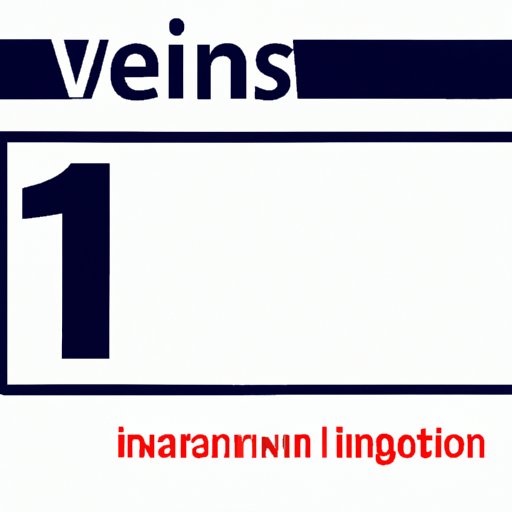
I. Introduction
As a business owner or self-employed individual, you may have heard of an EIN number, also known as an employer identification number. An EIN number is a unique nine-digit number that the IRS assigns to businesses and other entities for tax purposes. Having an EIN number can be essential for opening a business bank account, hiring employees, and meeting other legal requirements. In this article, we will provide a step-by-step guide for applying for an EIN number and cover everything you need to know about the benefits of having one.
II. Step-by-Step Guide to Applying for an EIN Number
The first step in applying for an EIN number is to fill out Form SS-4, which can be obtained from the IRS website or by calling the IRS. The form can be completed online or by mail, and it includes information such as your business type, name, and address. When filling out the form, it is essential to be accurate and thorough to avoid any delays or mistakes in the process.
Tips for completing the application process include double-checking the information you provide, ensuring that your business name matches any legal documents, and ensuring that your SSN or other taxpayer identification number is correct. Some types of businesses, such as partnerships or corporations, may have additional steps to follow when applying for an EIN number.
III. Importance of having an EIN number for your business
Obtaining an EIN number is essential for several reasons, including for tax purposes, hiring employees, and opening a business bank account. It is also required for LLCs and corporations. Having an EIN number can help you keep your personal and business finances separate, and it can protect your business from identity theft. It is important to note that having an EIN number does not automatically mean you are an employee, and it is not the same thing as a Social Security number.
IV. Breaking down the EIN application process for individuals and business entities
Individuals and businesses have slightly different procedures for obtaining an EIN number. As an individual, you can obtain an EIN number by filling out Form SS-4 and providing a valid taxpayer identification number, such as a Social Security number. Business entities, such as LLCs and corporations, may need additional documentation, such as articles of incorporation or partnership agreements, to obtain an EIN number. It is important to review the specific requirements for your type of business before applying for an EIN number.
V. Common mistakes to avoid when applying for an EIN number and tips to expedite the process
Sometimes, small errors can cause significant delays when applying for an EIN number. Common mistakes to avoid include providing incorrect information, not providing all the necessary information, and submitting the application with errors. To expedite the process, it is essential to carefully review your application before submitting it and to ensure that all required documentation is included.
Tips for expediting the process include applying online, completing the application during off-peak hours, and being compliant with all IRS tax obligations. By avoiding common mistakes, you can reduce the time it takes to receive your EIN number and get back to running your business.
VI. How to apply for an EIN number online and through the mail
There are two methods for applying for an EIN number: online and through the mail. Applying online is the easiest and fastest method and allows you to receive a validation receipt immediately. To apply online, go to the IRS website and complete the online application process. Applying through the mail typically takes four weeks to process. Simply complete Form SS-4 and mail it to the IRS with the required documentation.
Both methods require accurate and complete information to avoid delays. The online application is generally the preferred method because it is more efficient and faster.

VII. Understanding the EIN number application requirements and eligibility criteria
Understanding the requirements and eligibility criteria for applying for an EIN number can help you ensure that you meet all the necessary criteria. Some requirements include having a valid taxpayer identification number, being a US citizen or resident alien, and having a valid business entity. Non-US citizens may also apply for an EIN if they have a US-based business entity. It is important to review the specific requirements for your type of business before applying for an EIN number.
VIII. FAQs about the EIN number application process and how to get assistance if needed
Some frequently asked questions about the EIN number application process include:
- How long does it take to get an EIN number?
- What documentation is required to apply for an EIN number?
- Can I apply for an EIN number as a sole proprietor?
Answers to these and other commonly asked questions can be found on the IRS website. If you need assistance with the application process, you can contact the IRS directly for help or consult with a tax professional.
IX. Conclusion
Obtaining an EIN number is an essential step for businesses and self-employed individuals. It allows you to meet legal requirements, protect your business from identity theft, and open a business bank account. By following the step-by-step guide in this article, you can apply for an EIN number accurately and efficiently. Remember to review the specific requirements for your type of business and to avoid common mistakes to expedite the process. Apply for an EIN number today and enjoy the benefits of having one for your business.




